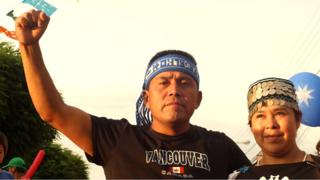Home » Latin America »
The man who saved Chile’s sacred river
A Chilean indigenous leader detained for allegedly taking part in a robbery has been awarded a prestigious environmental prize for his role in protecting a sacred river in his community.
Alberto Curamil, of the Mapuche community, won the Goldman prize – considered the “Nobel of environmental activism – for mobilising local people, lawyers and scientists in Chile’s Araucanía region to stop the construction of dams which he argued would destroy forests, rivers and wildlife.
In 2016, Chile cancelled plans for the hydroelectric projects on the Cautín River, citing public opposition for one and lack of consent and adequate assessment of environmental impacts for the other.
Mr Curamil, who was announced as one of six winners on Monday, could not be present to accept the prize following his arrest last August.
He denies any wrongdoing and his lawyers say his incarceration – pending trial later this year – is politically motivated.
Mr Curamil’s daughter Belén, 18, accepted the award on his behalf at a ceremony in San Francisco.
Speaking from the podium on Monday, she said: “The Mapuche struggle is an ecological struggle, it is a struggle for life and its continuity… We are people of the Earth, whose main mandate is to protect everything that makes existence possible, based on a spirituality connected with the natural elements.”
Who is Alberto Curamil?
The 45-year-old is a leader of the Alianza Territorial Mapuche (ATM). The group claims his detention is “the culmination of a long process of political persecution”.
Mr Curamil, who has worked to protect local rivers and forests, has also helped the Mapuche preserve their native language (Mapudungun) and defend their culture.
His battle against plans to install dams along the Cautín River began in 2013 after the projects, agreed by the government and two private energy companies, were announced without consulting the Mapuche.
He began a campaign of street protests and rallies, inviting people who were not members of the Mapuche community to participate.
He also sought advice from environmental experts and lawyers, before highlighting the concerns of both indigenous peoples and scientists in a court case.
Chilean law stipulates that prior and informed consent must be received before undertaking any development project.
The courts later ruled in favour of the Mapuche, stating that the projects would have been detrimental to the communities in the area, altering the environment and the course of a river that was culturally important.
A fellow campaigner and representative of the Mapuche community, Miguel Melín, told the BBC’s Alejandra Martins that Mr Curamil saw the Goldman award as “an acknowledgment not to him in personal terms, but to the struggle that the communities of the territory and the Mapuche people have given in general”.
Police arrested Mr Curamil for alleged participation in criminal activity and he has now been detained for nine months. His lawyer, Manuela Royo, told the BBC that his trial was likely to begin in July or August.
Members of the ATM group recently posted an image on Twitter showing Mapuche students “demanding the freedom” of the indigenous leader.
What makes the river so special?
The Cautín River flows through the heart of Curacautín, a community in the region of Araucanía in central-southern Chile.
It is an important part of the landscape in the region, not only for environmental and agricultural reasons, but because it holds spiritual value to the indigenous Mapuche people.
In the parts where the dams would have been located, locals believe the clean waters and vegetation provide remedies used by Mapuche to practice a traditional form of medicine called “machi”.
As Mr Curamil argued, the dam projects were not only illegal, but would have diverted hundreds of millions of gallons of water from the river each day, harming the critical ecosystem and exacerbating drought conditions in the area.
A 2017 study published on the journal website Brill found that the Cautín River does indeed provide an important ecosystem in the region, not only because it contains numerous fish and freshwater crabs, but because of the aquatic insects that it attracts.
Who are the Mapuche?
The Mapuche are an indigenous community who say they belong to the land – “mapu” means land, and “che” means people.
Some 9% of Chileans define themselves as Mapuche, making them the largest indigenous group in Chile.
Before the arrival of the Spanish in the 16th Century, the Mapuche inhabited a vast swathe of land in the country’s south.
They resisted conquest until the late 19th Century, when they were rounded up into small communities. Much of their land was subsequently sold off to farmers and forestry companies.
In recent years, tensions have increased and the Mapuche have waged a sometimes violent campaign to win back that land, often clashing with logging companies and farmers.
Armed groups of radical activists have been burning houses, churches, lorries and forest plantations with increasing frequency to highlight their discontent with the way they have been treated.
Chile’s President Sebastián Piñera has said he is focusing on solving the centuries-old conflict with the Mapuche, and there are some signs of progress.
Last year, Emilia Nuyado and Aracely Leuquén became the first two women of the indigenous Mapuche group to become members of Chile’s Congress.
What is the Goldman award?
The Goldman Environmental Prize was created in 1989 by US philanthropists Richard and Rhoda Goldman.
Prize winners are selected by an international jury from nominations submitted by a global network of organisations and individuals, according to the award’s official website.
The annual Goldman prize is awarded to activists from six regions around the world. Winners each receive $200,000 (£154,000).
Other winners this year are:
Source: Read Full Article



